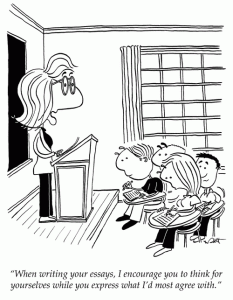Even liberal-minded Slate states the obvious:
journalists show their bias by what they ignore.
In 2004, Michael Moore created a movie critical of then president George W. Bush.
In 2012, Dinesh D’Souza created a movie critical of president Barack Obama.
In 2004, Michael Moore’s movie is the highest grossing documentary.
In 2012, Dinesh D’Souza’s movie is the second highest grossing documentary.
In 2004, Michael Moore was interviewed by prime time major news outlets.
In 2012, Dinesh D’Souza was interviewed by none of them.
In 2004, Michael Moore’s film was praised by The New Yorker.
In 2012, Dinesh D’Souza’ film was attacked by The New Yorker.
In 2004, Michael Moore’s work was described as a “documentary” in The New Yorker.
In 2012, Dinesh D’Souza’s work was described as “propaganda” in The New Yorker.
I could go on and on, but you get the point.
Why is one movie celebrated by journalists and the other defamed and/or ignored?
Below is a series of questions that should be addressed by mainstream media outlets.
Why does David Axelrod, working for Barak Obama, get to tell newsmakers that they need to go make Obama’s case that he did not make in the first debate? Does The White House control the media?
Why does the print media have to pass their stories by White House personnel before they can be printed in The New York Times ? The July 16th story say government officials must review, correct, and approve of a journalist’s writing before it is printed.
Many journalists spoke about the editing only if granted anonymity, an irony that did not escape them. No one said the editing altered the meaning of a quote. The changes were almost always small and seemingly unnecessary, they said. Those who did speak on the record said the restrictions seem only to be growing.
Why did journalists focus on Romney’s response to the killing of 4 Americans in Libya instead of focusing on the killing of 4 Americans in Libya?
Why do journalists not speak out when The White House creates “a position within a position” to tamp down unfavorable stories about the president?
Why is there no uproar from journalists when the president refuses to take a question for two months?
Why was there not more concern noted for contradictory numbers in the jobs report?
Why are journalistic polls allowed to skew numbers?
Why don’t journalists report on the non-riots from Mormons to the anti-Mormon play on Broadway the same way they report Middle Eastern riots over an anti-Islam film?
Obvious ironies aside, here is the categorical statement:
Bias occurs both by what is reported and by what is ignored.
“All Things Considered” (the title of an National Public Radio program) is not always true to its name.
Here are a few basic rules that some journalists may have forgotten from ancient texts (Deuteronomy 19:15-18; Proverbs 18.17):
- Every side of an issue should be fairly represented.
- Objectivity and accuracy is paramount.
- Accusations against individuals should not be ascribed to “unnamed sources.”
- Witness and accused must confront each other.
Here is hoping that journalists have not simply become the voice of The White House.
Mark is infuriated by coverage which maligns one person or group while giving a pass to another.

